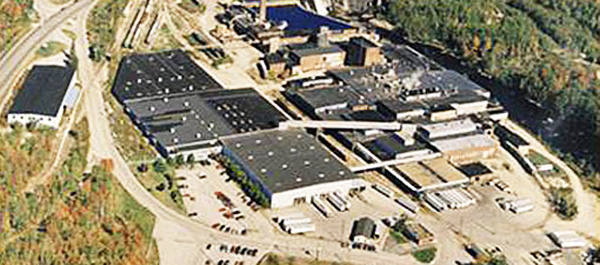
| Archive/Subscribe | TAPPI.org | Advertise | TAPPI Press Catalog | March 2015 |
White Mountain Tissue Explores Future of Maine Operations
According to a recent article by the Berlin Daily Sun, Berlin, N.H., USA, White Mountain Tissue (Gorham Paper and Tissue) officials report the company has put together a plan for the future that emphasizes a team approach, running the towel and tissue machines consistently, and developing new higher-end products.
"Volume is key to us. We have to run two machines," said CFO Wayne Johnson in a briefing to U.S. Congresswoman Annie Kuster.
Johnson said since Dick Arnold took over as CEO in December, the two men have been meeting with key customers and suppliers as well as employees. He said historically the three different interests have been miles apart. The strategy is to create a team approach.
"Bring all of us together so we're all on the same page – one team, one focus, one direction," Johnson said.
Unlike a year ago when natural gas prices spiked during winter and the mill was forced to curtail operations, New England has not experienced a similar situation this year. Johnson noted natural gas prices were in the $20 to $22 range per dekatherm compared with $78 last year. The mill continues to get some methane gas from the Androscoggin Valley Regional Refuse Disposal District's Mount Carberry landfill.
 Since the downsizing a year ago, Johnson said the mill is now at the right size and the goal is to run the two machines full time 365 days a year.
Johnson said the company is looking to develop higher end products that would draw higher prices. The mill currently produces tissue paper that it sells as parent rolls for the private label market. He said the company would eventually like to go into the retail business and sell a tissue product under its own brand name.
Asked how that would work, Johnson said initially GPT would contract out converting the parent rolls into tissue products. But he said the long-term goal would be to do that converting work at the mill.
Green said GPT is working on new product development under the direction of product development head Dee Carsley, but declined to share details publicly. He said the at-home tissue market is strong for the company and they are able to produce more value added products. He said the away-from-home towel business is more seasonal and that GPT lost some customers when high gas prices last winter forced shutdowns. He said some of those customers are returning.
The company is also working to re-establish ties with suppliers. At one time, GPT purchased its pulp from Old Town Fuel and Fiber, which was also owned by Lynn Tilton and Patriarch Papers. But Tilton sold the facility and while Gorham still buys some pulp there, Green said they are also purchasing from companies in Canada and Brazil.
The towel machine was forced to shut down Friday morning because of a lack of pulp, but two trucks had arrived that morning and the machine was set to be back up and running by Friday night.
Johnson said there are currently 140 people on payroll. Green said it has been frustrating for employees because many are working sporadically. With an average age over 60, the long-term viability of the mill is important to allow current employees to retire and a new generation of papermakers to come on board.
Johnson added that the mill is looking for support to increase jobs and economic growth, reduce energy and insurance costs, and help with workforce development. With many experienced papermakers set to retire in the next few years, training new younger workers is important.
Bill Everleth, maintenance specialist at GPT, said he and N.H. North Country Regional Resource Specialist Beno Lamontagne are working with White Mountains Community College to develop a millwright/machinist program. Kuster said there is money in the Farm Bill to invest in workforce development programs at rural colleges.
Green noted that manufacturers in the Northeast are at a disadvantage. Energy costs are high and transportation to a rural area like Gorham requires complicated planning.
Johnson said worker compensation insurance is high even though the mill's safety record has been good in recent years. Berlin Mayor Paul Grenier noted rates are based on seven years of experience and the mill's rates should go down.
Grenier asked about plans to operate the two specialty paper machines at the mill. Green said the company sees towel and tissue as the future of the mill. He said the company would look to operate the paper machines only as part of a partnership with another company.
Grenier also asked if GPT is still exploring using hot water produced by the Burgess BioPower biomass plant and Green said the two companies were scheduled to discuss that this month but the meeting got cancelled.
|

